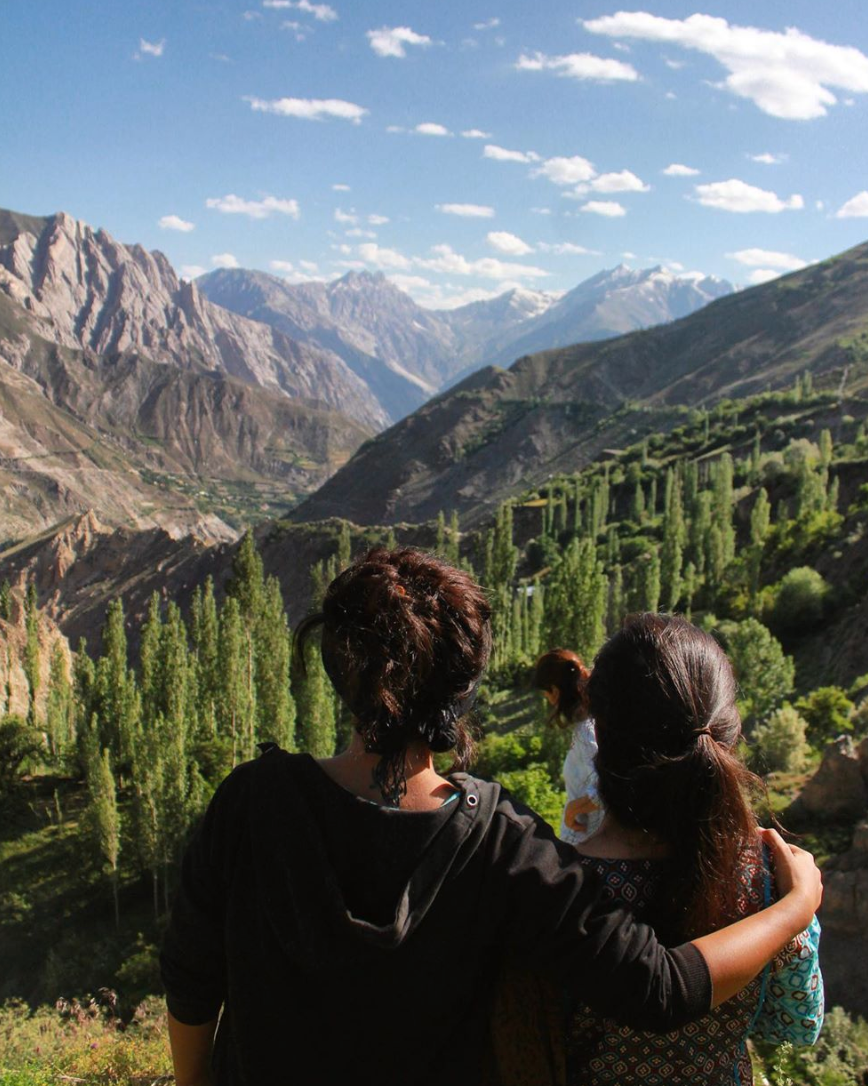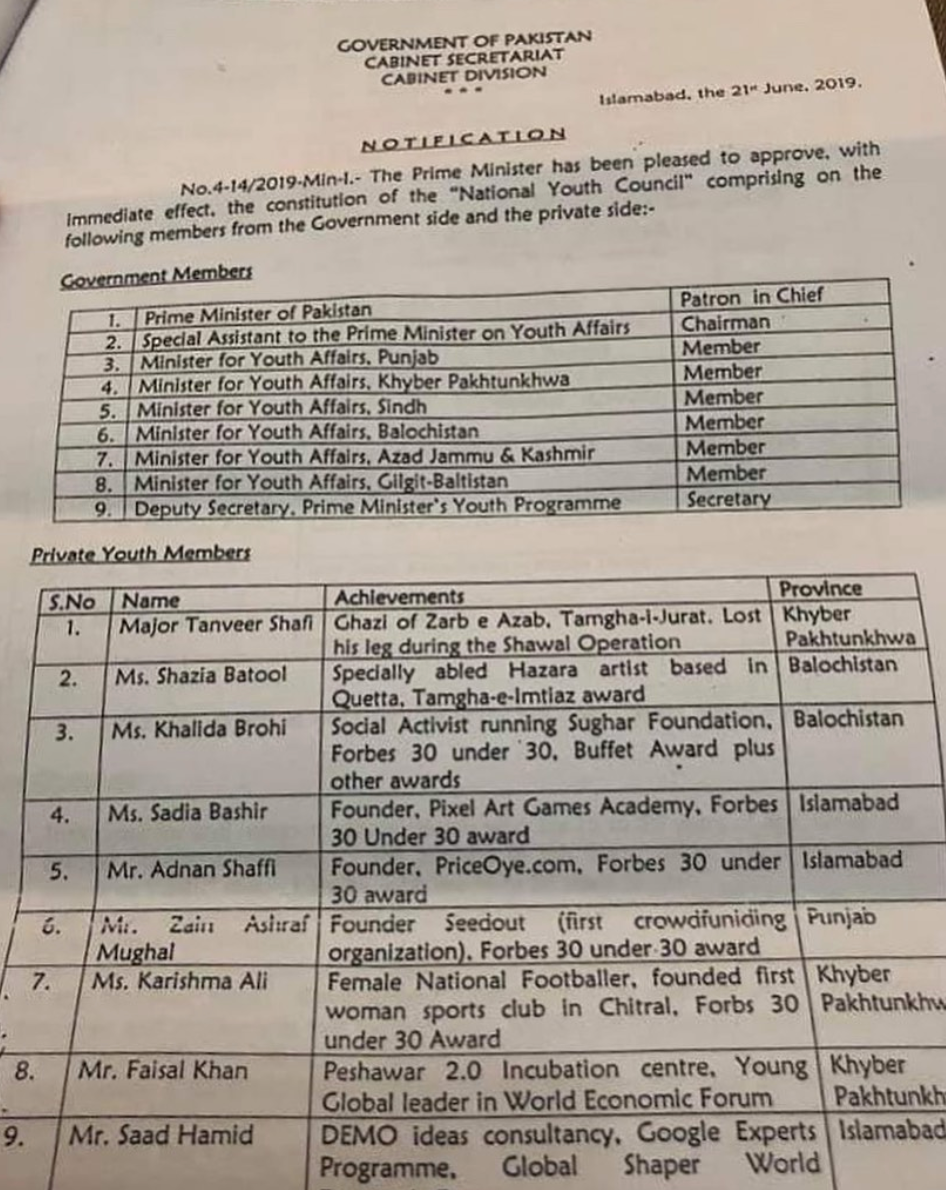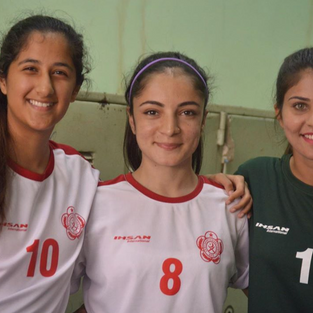Meet Pakistani Football Star and Girl Hero: Karishma Ali
- Content Creators

- Sep 22, 2019
- 10 min read
Maryam and Nivaal Rehman | Toronto, Canada

When we went to Pakistan this year, we had the pleasure of meeting and interviewing many individuals who are doing incredible work for the country and making a difference for girls. One person who we found out about when we came back from Pakistan, was Karishma Ali. She is a Pakistani football player, founder of the Chitral Women's Sports Club, and has most recently been appointed to the Prime Minister's National Youth Council of Pakistan. She is an incredibly inspiring person, who has dedicated her life to breaking barriers for women in sports, and ensuring that more girls in her home town of Chitral have more opportunities to play sports too. We had the pleasure of interviewing her for our blog, and for our "Whole Wide World" podcast. You can listen to our interview with her here: https://www.theworldwithmnr.com/podcasts?wix-music-track-id=5568363172462592&wix-music-comp-id=comp-jxqicdg2
1. How did you first begin with football, and how did you get inspired to start?
As a kid, I used to have a Dutch teacher, and my father happened to be a football fan. So what they would do, is watch the World Cups on tv and I would just sit with them and watch football. It was just really nice, and I liked how the players played the game and how good they were. And so I wanted to try and play with my father. I started playing with my dad and my teacher.
At first, of course, I was from Chitral and there was nothing like this for girls, it was something new. But I was a kid and I didn’t really understand the whole idea of girls not playing sports. So I just went out, and played with my dad on picnics and everything.
We didn’t have a team or club for girls so I would never get a chance like that to play at a professional level as a kid. But that’s how I started playing football and loving the sport.
2. What were some of the barriers that you faced in your sports journey?
I have faced a lot of barriers because of the place I come from. It is a very male-dominated, very conservative society. When I first started playing football, a lot of people didn’t find out. But later, when they did find out, they weren’t accepting of the fact that I was from that place. They were saying “No, that’s not possible that she’s from here. Because girls from Chitral do not play football. She’s probably from some other part of Pakistan.” And then, finally, they found out that I am actually from Chitral and they got curious. There was a lot of hate going on, on social media and people directly tried to approach me and they said “Stop playing football. You need to stop this. What are you doing? This is not how girls in our society act.” And then online I started receiving actual threats. People said that if I don’t stop this, it will not be good for me or for my family. I understand because I was the first female footballer from the place, so I understand why people went against me. But I wasn’t expecting it to be at that level. I didn’t think that I would receive so much hate, and especially when it kept going on for months and months.
As a sixteen-year-old, no matter how much you know about your society and think that you should be ready for this, but you’re never really ready for it.
So, yeah, I went through all of that and my journey has been quite a tough one.
3. What has been the most exciting thing for you in your career?
There are a few moments that I have been very excited about. The first, obviously is when I go back to Chitral and when I am playing with these kids and I see them happy, smiling and just free, and not caring, kicking the ball and running around, that makes me really happy and really excited. Another of course was when I was featured in Forbes Asia 30 under 30. That was just a really, really unexpected moment. I didn’t think that I could ever reach that level. I have changed a lot of minds in my society and my hometown. People look at me differently, people think of girls playing sports differently, people have become more open-minded and more accepting. So I think that was one of the most exciting parts of my journey.
4. Why is it important for girls to be in sports and what is the benefit of that? Also, what do you think is the connection of girls playing in sports and how that can be beneficial to their education?

There are a lot of things. People do not understand the benefits of sports. They just think it’s just sports, you’re playing, you get paid.
Yes, there’s the professional part of it but it has a lot of other benefits. For example, it has a lot of health benefits, and it’s really important for young girls to play sports. It also builds leadership skills in girls. You learn a lot of things and you’re a part of this team. It teaches teamwork, it builds confidence, it’s very good for the health.
I think generally it gives you a lot of opportunities, especially in a country like Pakistan. If you know how to take sports in a positive way. There’s no negative way that sports takes you. So I think it’s really important. Also, there’s a lot of school scholarships, a lot of university scholarships based on sports. I think it’s really important for girls from these areas to come out and show their talents, represent their country, and get all the benefits from sports like scholarships. Sports is really important for girls, especially in a male-dominated society like ours.
Also, sports, especially the morning sessions, have always helped me become more focused. And I think in sports, you’re very much focused on making goals and trying to achieve those goals. You’re always setting goals. Like, “Okay, in my next game, we have to win the game by this much points and we have to win the next tournament.” Things like that, you want to keep going ahead. When it comes to studies, you become more serious, and I think it’s been with me that I set goals for myself. Like, “Okay, today I’m to do this. Tomorrow I’m going to do this. This is what I’m going to do for my exams.” I think it helps you become more focused. I found it very interlinked in a positive way. I have found a positive relationship between sports and studies for myself.
5. Tell us more about the Chitral Women’s Sports Club.

So in 2016, I attended the Jubilee Games and after I came back from them, I thought to myself that I am so privileged that it is my responsibility to give back a little bit of what I have to these girls who are not as privileged. I went back to my hometown of Chitral in 2016, and I started it at a school level.

I went to a school, and I talked to them. I said that “I want to come for a week, do some sports camps and see if the kids are interested or not.” I organized a one-week football camp. And I saw a lot of the kids and the girls - they were very interested. They came in the next day and some of the girls were in football uniforms. They said “My dad bought this football uniform for me last night when I told him that we’re going to have football sessions. That gave me the idea that now, in this area, the girls are interested, their parents are also interested, maybe I should start something. In 2018, last year, I decided to start the Chitral women’s sports club, which is the first sports club for women in Chitral.
I was just very worried that not many people would show up, and so I thought that I would just prepare some things for maybe 20-30 girls. But when I went, I was really surprised to see how many girls were interested.
We sent out about 20-30 forms and said that you can fill out these registration forms if you want to be part of this sports camp. But I had 70 or something forms returned to me and I was very surprised. I was wondering how this happened, and a lot of the girls told me that they had photocopied the forms because they also wanted to be a part of the camp.
So it was really special to me, and this gave me the motivation. I thought, yeah the girls are interested, so I should definitely do something. So we had a one-week long camp and we took this camp into the far northern part of Chitral where there’s not a lot of people and we took this out of the villages so the girls feel safe and so they can easily play football. I was alone with a few volunteers, my father, and with the support of my family. We managed to finish a one-week camp following a one day tournament. In total it was eight days. I was really happy to see 70 girls participate in the camp and then we had 50 girls in the tournament.
On the last day, I called our mothers to see what type of benefits sports can give to their daughters. What I was happy to see was how happy the mothers were to see their daughters going out there playing and being carefree. That was really powerful for me. I was thinking that they would mind it, or think why are their girls running, or playing football. But it wasn’t like that. Everyone was really happy. That’s how we did it last year. And this year, we held another football camp in July for about eight days. And we had four professional coaches who have done a FIFA license. I brought these coaches from other parts of Pakistan so that these girls would have access. Because they don’t get to go out of their villages and they don’t get to interact with other people. And they were really excited to see these new coaches come in, they were speaking a different language but they were really excited for them. This year we also formed a team of 13 girls, so now we have a proper team for Chitral now, and I’m really happy about it.
6. You’re also part of the first Prime Minister’s National Youth Council for Pakistan. So can you tell us more about the council, how you got chosen and what that feeling was like?

I got a phone call in around April/May. They called for a small interview and they told me that there’s a new council that’s coming up, it’s really new, and the Prime Minister is going to lead it. We’re choosing the best youth of Pakistan who will be leading and making decisions for the rest of the youth. It was really exciting for me because, I mean why not - I always wanted a bigger platform so that I could reach out to more youth and girls. I was really excited and I was really happy. And of course, it’s such a big honour to be a part of the National Youth Council. We haven’t had the official launch yet, but I’m very much looking forward to it, so that we can make changes and make decisions for youth at a bigger platform.
7. Tell us about your recent trip to Brunei. You were representing Pakistan’s youth there. So, what did you learn and how do you hope to use that to positively change Pakistan?

I think it was such a great experience because you’re not just surrounded by young leaders, but you’re surrounded by youth ministers and surrounded by commonwealth leaders. Of course, there’s a lot of countries that have already had a lot of these youth programs that have been going on for so many years. We got to learn a lot from what difficulties they faced, what kind of opportunities that they created for the youth that are going in a really positive direction and is really good for youth. I think it was a really great experience and we’ve learned a lot from different countries, and we’re just really hoping to use that for our National Youth Council in forming the policies for the upcoming youth programs.
8. What are some of your future plans? Whether that is with sports, your school, your football club, what are some of your future plans and what do you hope to accomplish?

For myself, I really want to go further than where I am right now. Because the situation for sports in Pakistan is not in the best position right now. And especially for football and for girls, I don’t know where it’s going and I don’t know what they’re doing right now. So I want to take this at a professional level and I’m hoping to go abroad and maybe train with a club over there. For the girls, of course I really want to make proper grounds where these girls can go and play, be comfortable, and form teams in Chitral for different sports. I want more girls like myself who come out there and fight for their rights.
9. Are you studying right now, and what are you studying in university?
I’m doing my Bachelor’s, it’s a University of London International Degree and I’m doing it from a local university here. And I wanted to do Sports Management, but I didn’t find any university in Pakistan that’s offering Sports Management, so I decided to go with a Bachelor’s in Business and Management and then maybe do my Master’s in Sports Management.
10. What is a message that you have for other youth who want to get involved with sports, or have really big dreams and might not feel like they can accomplish them?
You know, as a nine-year-old girl who was watching T.V. back there in a village in Chitral, if I was told that one day I’m going to be featured in Forbes for what I did, or for playing football, or for having my own sports club, I would not believe it. So this is what I am saying to everyone else who has a big dream.
If your dream is not scary - if it doesn’t scare you, or the people around you, then is it even a real dream? So keep dreaming big, and anything is possible in this world. You just need to be very focused, and you need to believe in yourself, and you need to work hard. That’s what I believe.
Whatever I have accomplished coming from there to this level, I think anyone can accomplish anything. I truly believe it. And I think even if people around that time were told that there would be a girl from Chitral who would play football, who would represent Pakistan and then also form a team here, everyone would be laughing. So I think it’s very important to have a big dream, and then just stay focused. Don’t listen to anyone else. Don’t listen to negative feedback. Just carry forward.
.png)





























Comentarios